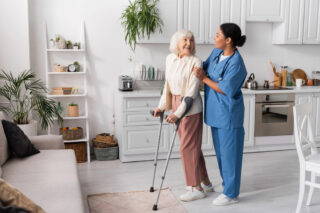
Home Helpers Home Care of Manassas-Gainesville, VA
703-952-3844

More Senior Health Articles
Promoting Independence in Aging

How Caregivers Can Help Seniors Thrive at Home
Aging brings challenges, but it doesn’t have to mean a loss of independence. For many seniors, the ability to remain at home and retain control over their daily lives is central to maintaining dignity, confidence, and quality of life. Caregivers play a key role in supporting this independence while ensuring safety and well-being.
1. Foster a Safe, Adaptable Environment
Creating a home environment that balances independence and safety is essential. Simple modifications—grab bars in the bathroom, non-slip washable rugs, improved lighting—can reduce the risk of falls and accidents. Encouraging seniors to participate in decisions about these changes helps them feel in control rather than restricted.
2. Encourage Participation in Daily Activities
Even if a senior needs assistance, encouraging involvement in routine activities helps maintain motor skills and self-esteem. For example, a caregiver might invite a senior to help with meal preparation, light housekeeping, or selecting clothes for the day. These small tasks promote autonomy and a sense of purpose.
3. Support Mobility and Physical Activity
Maintaining physical strength and flexibility is key to preserving independence. Caregivers can gently encourage movement, whether through supervised exercise, short walks, or stretching routines appropriate for the individual’s abilities. Remaining active not only supports mobility but also benefits overall health and mood.
4. Promote Cognitive Engagement
Independence isn’t just physical—it’s mental as well. Encouraging seniors to stay mentally active with reading, puzzles, hobbies, or conversation helps keep their minds sharp. Involvement in planning outings or managing personal tasks, like organizing a calendar or writing letters, can also reinforce a sense of independence.
5. Respect Personal Choices and Routines
Wherever possible, caregivers should respect a senior’s preferences about meals, daily schedules, and personal habits. Routine provides comfort, and preserving the rhythms of daily life helps seniors feel secure and self-reliant.
For family members, it’s important to remember that supporting independence doesn’t mean doing everything alone. If you’re feeling overwhelmed, professional home care services are available to provide the right balance of assistance and independence—helping your loved one continue living safely, comfortably, and confidently at home.
Other Articles You May Find of Interest...
- Integrative Healthcare For Seniors
- What Families in Houston Realize About In Home Care
- Supporting Senior Health Without Taking Over: Finding the Balance
- Home Health Care vs. Assisted Living: Understanding the Differences and Choosing the Right Care Option
- Navigating Tylenol Side Effects in the Elderly: What Caregivers Need to Know
- Optimize Your Thyroid Health with the TSH Dose Calculator
- How to Check Medicaid Application Status Without Delays














